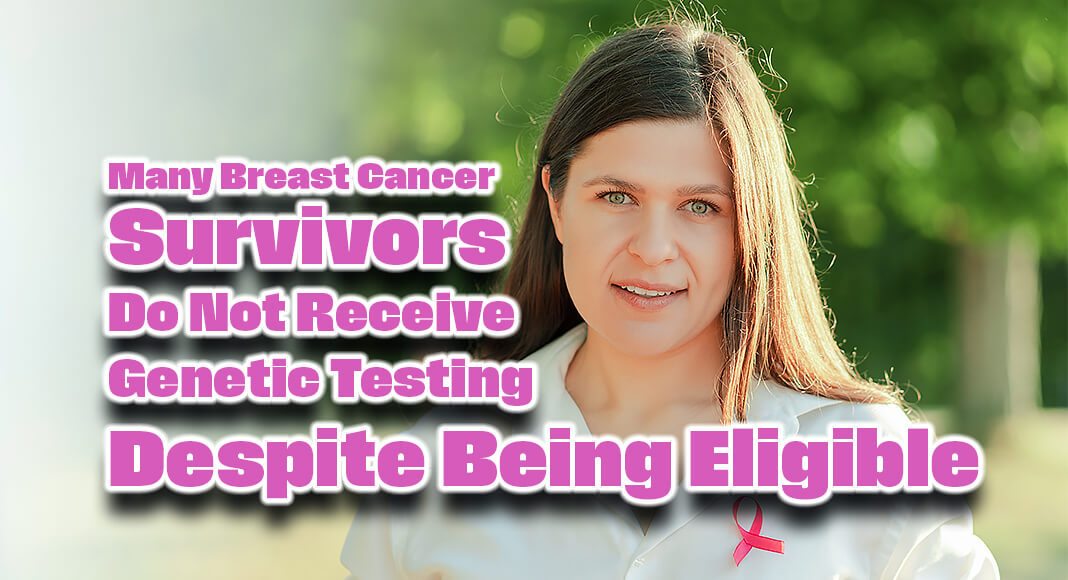
Mega Doctor News
By Michigan Medicine – University of Michigan
NEWSWISE – ANN ARBOR, Michigan — As cancer treatment and survivorship care relies more on understanding the genetic make-up of an individual’s tumor, a new study from the University of Michigan Health Rogel Cancer Center finds that many breast cancer survivors who meet criteria for genetic counseling and testing are not receiving it.
The good news: Among those who do get testing, nearly two-thirds who have a genetic variant are reaching out to family members to talk about their results
“Our findings support a rapidly growing movement to simplify clinical guidelines to increase access to genetic testing and clinical impact of the results after diagnosis and into survivorship,” said lead study author Steven J. Katz, M.D., M.P.H., professor of internal medicine and of health management and policy at the University of Michigan
Researchers surveyed 1,412 women seven months and again six years after they were diagnosed with early stage breast cancer. The patients were identified through Georgia and Los Angeles County Surveillance Epidemiology and End Results, or SEER, registries. Participants were asked whether they received genetic counseling or testing and if so, whether they talked with relatives about results.
Clinical guidelines are changing to include more people eligible for genetic testing. The tests themselves are including more genes that could help guide not only treatment but follow-up care and screening. Results can also impact family members who may also be at increased risk of cancer.
The study found that nearly three-quarters of patients who were eligible for genetic testing at diagnosis received it over the study period. Just over half of patients who had indications for testing during follow-up care received it and about a third with no indications received testing.
Those who got testing and found they had a genetic variant were most likely to talk with their family about the results compared with those who did not.
Researchers also found that few people were interested in direct-to-consumer genetic tests, which are not as sophisticated as clinical-based genetic testing and counseling. Results are published in the Journal of Clinical Oncology.
“Genetic risk evaluation and testing can fall through the cracks during survivorship as patients’ needs for ongoing treatments, managing the side-effects of treatments, and monitoring for recurrence or progression grow,” said senior study author Lauren Wallner, Ph.D., M.P.H., associate professor of internal medicine and epidemiology at U-M. Wallner is also the co-leader of Rogel’s cancer control and population sciences program.
“Our findings reinforce the need for novel approaches to genetic risk evaluation and testing in practice to target prevention and early detection strategies for their patients and their families,” said senior study author Allison Kurian, M.D., M.Sc., professor of medicine and of epidemiology and population health at Stanford Medicine.
Researchers have additional studies planned to look at how survivorship care is coordinated between oncologists and primary care providers with a goal of improving survivorship care.
Additional authors: Paul Abrahamse, Allison Furgal, Rachel Hodan, Rachel S. Tocco, Kevin C. Ward, Ann S. Hamilton
Funding for this work is from American Cancer Society grant RSG-19-015-01, National Cancer Institute grants P01 CA163233 and P30 CA046592
Disclosure: None
Paper cited: “Genetic counseling, testing and family communication into survivorship after diagnosis of breast cancer,” Journal of Clinical Oncology. DOI: 10.1200/JCO.24.00122
Resources:
University of Michigan Rogel Cancer Center, www.rogelcancercenter.org
Michigan Medicine Cancer AnswerLine, 800-865-1125








